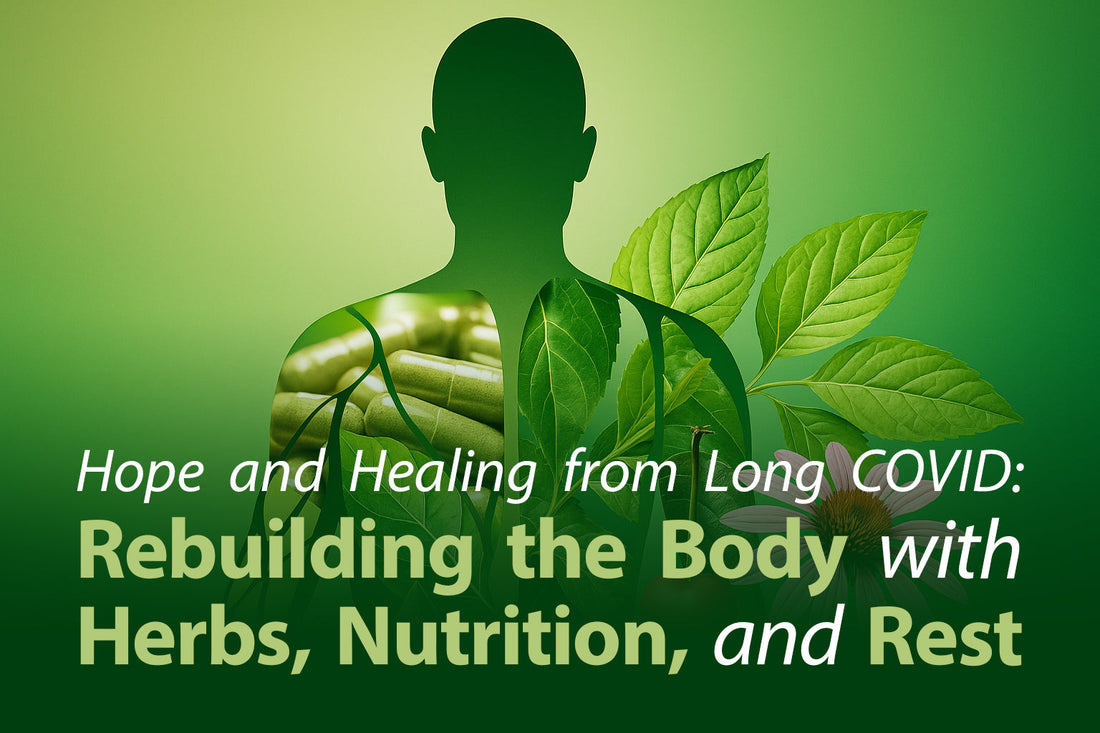
Hope and Healing from Long COVID: Rebuilding the Body with Herbs, Nutrition, and Rest
Share
Hope and Healing from Long COVID: Rebuilding the Body with Herbs, Nutrition, and Rest
Many people are still struggling with the lingering effects of COVID-19. Known as Long COVID, these symptoms can last for weeks or even months after the initial illness. People report fatigue, brain fog, digestive troubles, shortness of breath, chest pain, anxiety, and sleep disturbances that make day-to-day living difficult.
COVID doesn’t just impact the lungs—it can affect the brain, nervous system, cardiovascular function, and gut microbiome. Inflammation, oxidative stress, and disruption to normal metabolic and immune function are all part of the picture. The road to recovery may feel uncertain, but the good news is that natural strategies—centered on nutrient-rich herbs, heart support, gut health, and sleep—can help rebuild strength and bring the body back into balance.
Whole-Body Recovery Begins in the Gut
Many lingering symptoms of Long COVID are connected to imbalances in the gut and nutrient depletion. Natural compounds like quercetin, found in apples and onions, have been shown to reduce inflammation and support immune health. Vitamin D deficiency is common in Long COVID patients and may worsen fatigue and immune dysregulation. Vitamin C and L-arginine may also support circulation, energy, and tissue repair.
Gut health is especially important. COVID can disrupt gut bacteria, leading to poor digestion, inflammation, and even mood changes. Rebuilding the microbiome through probiotics, fermented foods, and herbal support can bring powerful relief.
Elderberry enhances the composition of gut bacteria and supports healthy glucose and fat metabolism, while also reducing oxidative stress. Reishi mushroom helps improve insulin sensitivity, supports liver function, and reduces inflammatory triggers in the gut.
Nutrient-Dense Herbs to Rebuild from Within
One of the most important ways to nourish a post-COVID body is through herbs that are naturally rich in minerals, vitamins, amino acids, and protective plant compounds. Three of the most restorative are alfalfa, nettle, and dandelion.
Alfalfa is packed with vitamins A, C, E, and K, as well as iron, calcium, potassium, and fiber. It helps replenish mineral stores and support digestive health. Some research suggests it may even help lower cholesterol and ease allergic sensitivity.
Dandelion is a bitter herb that supports liver detoxification, boosts bile flow, and feeds beneficial bacteria with its prebiotic fiber. It’s rich in potassium and helps regulate blood sugar and inflammation—two key factors in Long COVID.
Nettle nourishes the gut lining, calms immune overactivity, and aids detoxification through the liver and kidneys. It provides essential trace minerals, supports hormone balance, and reduces inflammation—especially when paired with gut-healing protocols. Together, these three herbs offer deep nourishment for recovery.
Herbal Support for the Heart and Circulation
Long COVID can impact blood pressure, circulation, and heart rhythm. Supporting the cardiovascular system is essential for restoring stamina and easing fatigue.
Hawthorn is one of the most well-researched herbs for heart health. It improves circulation, strengthens the heartbeat, and acts as a vasodilator, helping blood vessels relax. It’s rich in antioxidants and has been used for centuries for conditions like high blood pressure, angina, and weak heart function.
Hibiscus is another powerful heart herb, known to help lower blood pressure by acting as a natural ACE inhibitor. It also helps the body eliminate excess fluid without depleting essential minerals.
Dandelion contributes to cardiovascular wellness by acting as a gentle diuretic and regulating electrolyte balance. Olive leaf, rich in a compound called oleuropein, improves arterial flexibility, reduces inflammation, and supports healthy blood pressure. These herbs work synergistically to support circulation and prevent complications tied to lingering post-viral stress on the heart.
Restoring Sleep and the Nervous System
One of the most important and overlooked parts of recovery is restful sleep. During sleep, the brain repairs itself, the nervous system recalibrates, and the immune system resets. Many Long COVID sufferers report insomnia, restlessness, or disrupted sleep patterns. Addressing this can be a key turning point in recovery.
Several calming herbs can support GABA activity, which helps promote deep relaxation and quality sleep. Skullcap soothes an overactive nervous system and helps reduce anxiety and racing thoughts. It’s especially helpful for sleep onset and works well when combined with other calming herbs.
Chamomile is a gentle sedative herb often used at bedtime. It contains apigenin, which binds to receptors in the brain that promote drowsiness and reduce anxiety. It’s calming without being overpowering, making it safe and reliable.
Valerian helps reduce the time it takes to fall asleep and may improve sleep quality without leaving you groggy. It works by increasing GABA levels in the brain, supporting relaxation and nervous system repair during sleep. When used consistently, these herbs help restore restful cycles and support the healing of both body and mind.
A Full-Body Approach to Recovery
Healing from Long COVID isn’t about just treating symptoms—it’s about restoring the systems that have been strained or depleted. Combining nutrient-dense herbs, cardiovascular support, gut healing, and sleep restoration creates a foundation for long-term wellness.
This complete regimen can help the body regulate inflammation, rebuild mineral stores, improve oxygen and blood flow, and support nervous system repair. With time, patience, and the right support, many people are finding their way back to vitality, energy, and peace of mind.
You don’t have to navigate this alone. Nutrition, herbs, and rest offer a powerful, natural path forward—one rooted in your body’s ability to heal itself when given the right tools.
